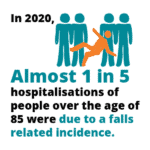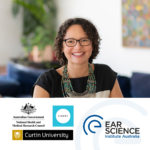
Researchers at Ear Science helped create an educational resource for aged-care workers to support their clients with hearing loss that might be contributing to them feeling sad.
Hearing loss is a significant barrier to effective communication and directly impacts mental well-being. The effect on mental health is amplified in an aged-care setting with a higher prevalence of hearing loss.
FACTS | Three in four Australians over 70 years have a hearing loss, and two-thirds of those who could benefit from hearing aids not do have them.
On the subject of not going to social events, I think one of the reasons why I don’t go because it’s just so exhausting trying to hear. You have a lot of noise, you try to focus on a conversation, and it’s just exhausting, it’s easier just not to go or just to sit, because it’s too tiring, and I think a lot of people in this room would have that same issue. Adult with hearing loss
One of the first things that older adults with hearing loss report is that it affects their social life. Being with friends, grandchildren, and social settings becomes distressing as voices become indistinct. What is said cannot always be understood, resulting in many people with hearing loss avoiding challenging social situations. Disconnecting from social interactions can cause older adults to become isolated and lonely, leading to anxiety and depression. The feeling of loneliness is often the case for older adults living in aged-care facilities who have not received adequate hearing intervention.
I don’t tend to go to things where there’s going to be a lot of people because I embarrass myself or I don’t hear the joke or I say something completely inappropriate because I’ve misheard. Adult with hearing loss
Hearing loss contributes to social disconnection, low mood and general sadness, all of which can be everyday experiences for people living in aged-care facilities. Yet, aged-care staff report not knowing how to open a conversation about emotional well-being nor how to provide adequate support to residents.
The Australian Association of Gerontology set up a panel of aged care professionals and academic experts, including Ear Science’s Dr Bec Bennett, to tackle this issue. The panel developed an easy-to-read educational resource in consultation with older people and the aged-care workforce. It provides an example of what aged-care support workers can do and say for older people who feel sad. The resource highlights that addressing the hearing needs of older Australians is key to delivering holistic client care and supporting their well-being.
The resource is available for free from www.aag.asn.au/news-publications/policy-papers/mhbrochure






